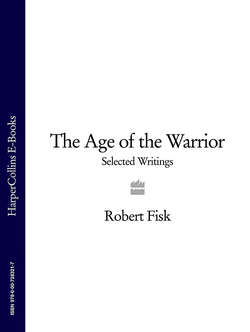Читать книгу The Age of the Warrior: Selected Writings - Robert Fisk - Страница 29
Оглавление
The pen, the telex, the phone and the despised e-mail
The laptop has done bad things to us. I’ve spent the past year writing a history of the Middle East which has proved to me – quite apart from the folly of man – that the computer has not necessarily helped our writing or our research into the sins of our fathers. As a journalist who still refuses to use e-mail – forcing people to write real letters cuts down the amount of ungrammatical and often abusive messages we receive – I would say that, wouldn’t I? But, along with a researcher, I’ve ploughed through 328,000 documents in my library for my book – my reporter’s notebooks, newspapers, magazines, clippings, government statements, letters, photocopies of First World War archives and photographs – and I cannot escape the fact that the laptop has helped to destroy my files, my memories and, indeed, my handwriting. My notebooks of the Lebanese civil war in the late 1970s are written in a graceful easy-to-read script, a pale blue fountain pen moving in a stately way across the page. My notes of the 2003 American invasion of Iraq are illegible – except to myself – because I cannot keep pace with the speed of the laptop. I no longer write words, I have discovered. I represent them – that is to say I draw their likeness, which I cannot read but which I must construe when transcribing them. I should add at once that this very article is being handwritten on an Air France jet from Beirut and even now, as I write, I find I am skipping letters, words, and expressions because I know what I want to say – but it is no longer there on the page.
What a relief to go back to my reports on the 1979–80 Soviet invasion of Afghanistan. They were punched out on telex machines – those wonderful clunkers that perforated tapes – even though, today, the wafer-thin paper falls to pieces in my hands. I remember a Kabul post office official using a welding iron to cement the H back on to his machine – Conor O’Clery of the Irish Times is my witness – but I have every memorandum and every report I sent to my then employers at The Times.
Today, we use telephones – or e-mails, which are easy to delete – but my telexed messages to London in those terrible years of war, just as in the 1980–88 Iran–Iraq conflict, tell their own tale. When I was filing reports from Cairo or Riyadh, a foreign desk ‘blooper’ – a last paragraph cut, an inelegantly phrased headline – was easy for a foreign correspondent to forgive. But emerging from Iran’s front lines at Fao – guns, shellfire and corpses – I found it difficult to see a dropped comma as anything but an act of treachery by The Times. Pity the poor foreign desk. And the correspondent. Of course, there are ridiculous moments in this historical ‘search for truth’. My researcher, after only three days of work, could not understand why she constantly felt hungry at mid-morning – until we realised that between 1976 and 1990, the only way I catalogued my flights around the Middle East was by noting the destination and date on my airline lunch menus. Three days of foie gras, caviar and champagne was too much for my brave friend to read. For my part, I did not, for many weeks, understand the deep depression in which I would go to bed – or wake – after hours of writing.
The answer was simple: the written notebooks and telex tapes – taken together – became an archive of humanity’s suffering, of torture and despair. As a journalist, you can catalogue this daily, go back to your hotel and forget and start again next day. But when I put the telex tape and the notebooks together, they became a dreadful, utterly convincing testimony of inhumanity. Telexed copy dies out in my files in the late 1980s and computer records suddenly arrive. But they don’t work. While I always kept a ‘hard copy’ of my reports for The
